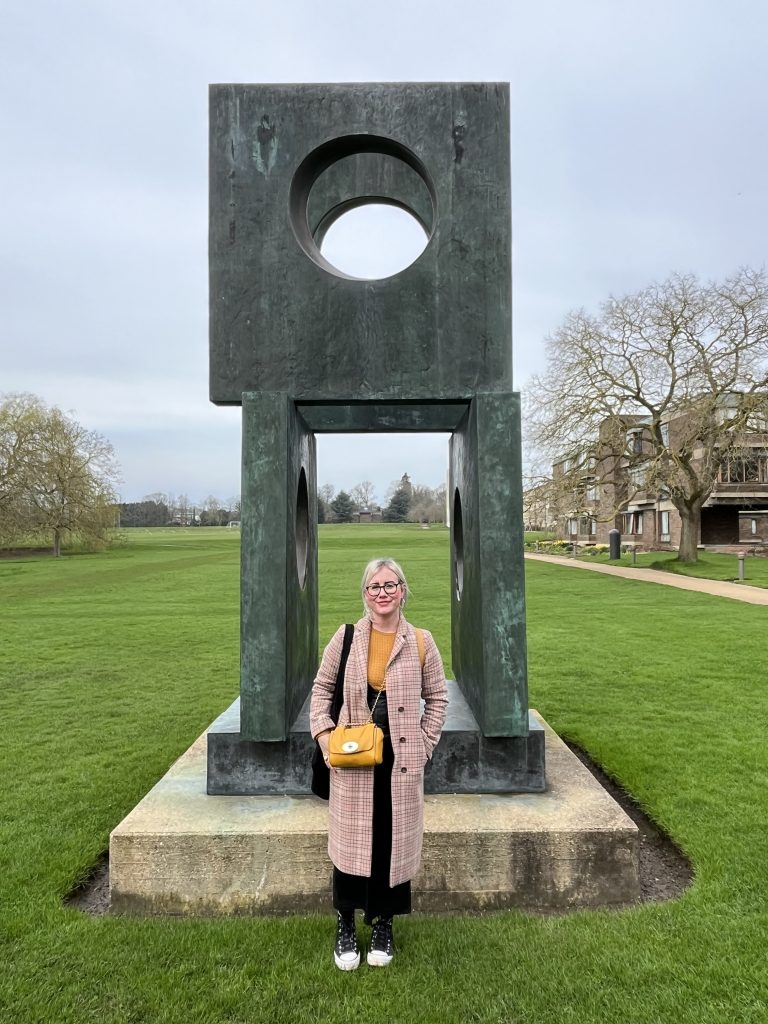
In celebration of World Poetry Day on 21 March, Wendy shares a blog about her research journey.
My PhD research at Manchester Met is based on how Barbara Hepworth’s sculptural practice could be used to inform a new poetic practice. My supervisory team is interdisciplinary: shared between Creative Writing and Art History.
In 2020 I was at an online writing workshop when someone spoke about Ekphrasis and, even though I didn’t know what it was, I fell immediately in love with the concept. Through this form, essentially writing a poem about a piece of art, I was able to convey a way of writing erotically based on the feelings I got from Hepworth’s sculptures. I have always felt an internal pull towards Barbara Hepworth’s sculptures, one which I didn’t, and still don’t, feel with other artists, or art forms. Hepworth’s work creates a physical bond and I feel close to it in the same way I would feel with a friend or lover. Using art to write is both intimate and collaborative. My falling in love in writing about art can be seen in my debut pamphlet, Plastic Tubed Little Bird (Broken Sleep, 2023) where Barbara Hepworth appears in one form or another in several poems.
In January 2023, before I had applied for my PhD, I received ACE funding as part of the Developing Your Creative Practice grant. I visited many of Hepworth’s sculptures and worked with two mentors, the poets Richard Scott and Anthony Anaxagorou. It was during this period of intense research, that I really became aware of how important it was to my own practice to see Hepworth’s sculptures in the physical. There was also a period after such aesthetic immersion when I couldn’t write. I had to learn that this period of process was as important as the writing, and that learning about how you research is as important as the researching itself. The DYCP allowed me a period to do this, and it is a practice which continues with the PhD: there’s the intense reading part, the obsessional writing, and the subsequent feeling of complete exhaustion of being on your own with your idea. It is a relationship which is both wildly passionate, and emotionally destructive.

Starting the PhD has completely changed my relationship with my own poetic practice. In my first few years of writing, submitting was my measure of how I was doing and at first, without the highs and the always motivating lows of rejection, I felt slightly lost. But now I am immersed in my PhD and enjoying the new challenges it brings.
In February I visited The Women’s Art Collection at Murray Edwards, and Kettle’s Yard, both in Cambridge. At Kettle’s Yard I was lucky enough to see Hepworth’s Maquette for ‘Garden Sculpture’ (1951) which was not on display. Hepworth’s use of the maquette is a central part to my research and to see it, out of sight in a storeroom, was hugely significant. Getting to know my research practice is interesting; after such an intense day, I must let the whole thing sit inside me for a few days.
Recently, in a podcast I present with Dr Charley Barnes, we talked with Dr Rob Francis about the similarities between geopoetics and poetry of the body. Poetry as an interdisciplinary practice enables us to link ideas. It is a form which works well with others. Poetry loves collaboration. I have worked collaboratively on a couple of projects recently. At the end of February, my first collaborative collection was published. Written with Dr Charley Barnes, freebleeding (Broken Sleep) is a series of poems and prose and letters about menstruation. I have also written i get lost everywhere, you know this now (Salo Press) with Galia Admoni, which, through lists, and prose and experimental poetic forms, is staged around galleries and libraries. There is a liberation to writing in these ways, that poetry gives us the same artistic scope as the vast sculptures I love so much.
I’m attending my first conference in March in Cambridge and then later in spring, one at The Courtauld for early researchers. I’ve loved attending the doctoral research training sessions at Manchester Met. Last week I attended one on writing an abstract. As someone who is new to academia, there is a lot I don’t know. Before the course I had no idea how to write an abstract and had looked at presenting at conferences longingly but had a fear that I didn’t know how to, and that everyone else did. These sessions have been wonderful and reassuring.
The thing I’ve loved the most about these past few months has been getting to know the way I research best. The reading and the gallery visits and the thinking and the not thinking and the writing wildly in notebooks in coffee shops and the research trips and the not writing and the absence and time away and the loving it and hating it. These are my ways of working, emotive and unpredictable, and mostly, unexpected. And possibly that’s why I like the fluidity of poetry and form, and the interdisciplinary nature of my PhD.


